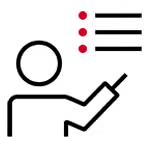
With the rapid developments and technological advancements happening in the industry, self-driving vehicles or Autonomous Vehicles (AVs), have the potential to make daily life easier, improve safety by reducing human intervention and error, and increase the usability of vehicles for both commercial and personal use.
An evolving landscape for AV design and testing
Legacy OEMs and suppliers now face direct competition from new technology-based companies, and these newcomers find themselves navigating the challenges of automotive manufacturing. Pilot vehicles with an L3 level of autonomy (partial autonomy supported by driver override as needed) are already undergoing road testing. As levels of driving automation increase and vehicles begin to perform additional driving tasks with reduced human intervention, standards must evolve. Similarly, manufacturers in the AV space must continue to innovate with a focus on safety and building confidence with skeptical consumers.
Unpredictability in autonomous vehicle design
Although AVs reduce or eliminate human error, an array of safety and product development challenges continue to reshape the market. One primary challenge is that AVs still share the road with human drivers, but engineers may develop self-driving systems that assume everyone follows road rules. However, this is obviously not always the case, so the advanced artificial intelligence, machine learning models, and algorithms that support AVs must be designed to manage the unpredictability of a driving experience that still contains human error.
Accounting for the many unknowns on the road leads to uncertainty and highlights the need for unique approaches to addressing safety and performance. Along with helping you navigate the many variables involved in the development and implementation of AV technology, UL Solutions experts can help bring clarity to the standards.
AV standards lack depth of legacy automotive standards
Existing automotive standards do not address autonomy and many autonomy standards are not yet mature enough to provide complete guidance. As a result, there is a lack of consensus regarding what testing and validation is required to establish confidence and even what type of testing might be necessary.
The safety of the intended functionality (SOTIF) standard, ISO 21448, is relatively new. When approaching the idea of unknowns addressed in the standard, it is essential to focus on what AVs know rather than what engineers know. This sounds simple but is often overlooked or misunderstood.
As the AV market matures and technology advances, SOTIF and other standards will continue to strengthen, and manufacturers will continue to build confidence and competence regarding what is required. However, keeping pace with the regulatory changes in such a rapid market will likely remain a significant task as the industry matures.

Collaboration and training help build competence
The AV market can benefit from collaboration between AV manufacturers and suppliers, governments and regulatory bodies to establish consensus and develop safer guidelines for product design and development. Stronger standards will help shape a stronger industry capable of delivering safer products, which will in turn help build trust with both manufacturers and consumers.
UL Solutions is active in the AV market. Our experts work with regulatory bodies, authorities having jurisdiction (AHJs) and governments to help support a safer future. This involvement provides us with a firsthand look at the challenges manufacturers and suppliers face, and we have built our training services with these challenges in mind.
AV safety training and consulting from UL Solutions
Increase your competence in AV safety standards and learn industry wide practices through our comprehensive consulting and training. Our experts provide training on a range of topics that cover the latest technology and prioritize safety.
Consulting
- Integration of ISO 21448 processes to product development.
- Developing work products for ISO 21448 compliance.
- Defining acceptance criteria and validation targets.
- Perform safety analysis such as Systems Theoretic Process Analysis (STPA), inductive and deductive analysis for identifying and mitigate functional insufficiencies.
- Development of holistic safety case for autonomous vehicles leveraging ISO 21448, UL 4600 and ISO PAS 880 as well as other emerging standards and specifications.
Trainings
These training courses are offered on a regular schedule or can be provided on-site and tailored to your specific needs. Engaging with our experts for consulting can also help you navigate unique challenges related to your AV system designs and products.
- UL-CASP (ISO 21448) – SOTIF certification
- Overview of SOTIF (ISO 21448)
- Executive overview of SOTIF (ISO 21448)
- UL-CASP-ML (Machine learning) certification
- ISO PAS 8800
- UL-CASP (UL 4600)
UL Certified Autonomy Sell Sheet
UL Certified Autonomy Safety Professional Training Machine Learning
Autonomy Safety and Functional Safety Sell Sheet
SOTIF Functional Safety Automotive Brochure
Get connected with our team
Thanks for your interest in our products and services. Let's collect some information so we can connect you with the right person.


